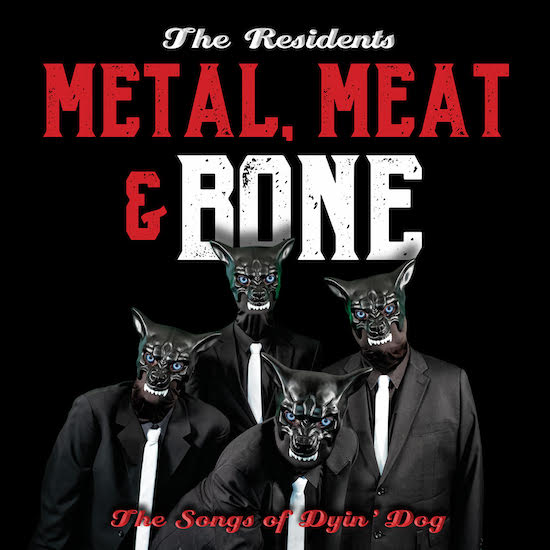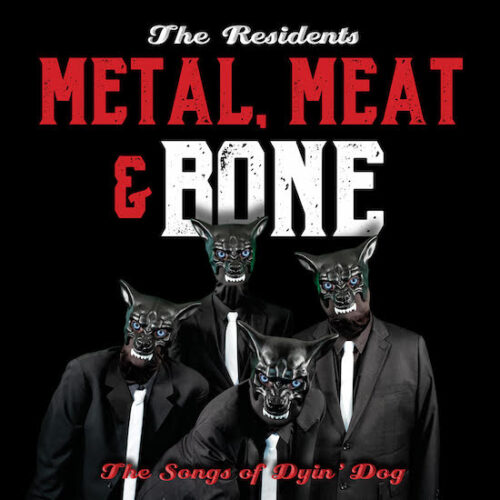“Ignorance of your culture is not considered cool”. This old pronouncement from The Residents’ fan club W.E.I.R.D., has long rattled around in my memory. I first came across it in Julian Cope’s mighty autobiography, Head On, a personal starting point for being slowly sucked into the San Francisco band’s remarkable world, one devoid of the usual trappings of pop music.
A collective once brilliantly described as “isolates” by Jon Savage, The Residents are secret autodidacts who act as the lining on a mirror, reflecting back to us new perspectives on our cultural assumptions. And even though we are – to all intents and purposes – still ignorant as to who all The Residents were or are, this ignorance can be considered cool; as their collective anonymity demands focus on their work.
With this, their double-album homage to long-lost Louisiana bluesman Alvin Snow, aka Dyin’ Dog, we have another complete world to digest and new information to file. It’s a ferocious release, channeling the righteous rage of an albino boy born to a mixed race family in 1939 and left on the steps of an orphanage. “Homage” may be an inadequate word in describing Metal, Meat & Bone, as this double set also acts as an introduction to an original artist, an enjoyable stab at a stay-at-home rock opera with an all-star cast including Black Francis, a brilliant set of reinterpretations and – given the intriguing sleeve notes – a launch pad for new fantasies.
Listening to The Residents always evokes emotions that are difficult to process. At once unnerving and inspiring, their latest release has – through repeated plays – revealed talismanic properties. Maybe The Residents have hit a mainline to Dyin’ Dog’s restless, shamanic soul, for Metal, Meat & Bone manages to be both a hypnotic and focussed listen, despite its length. For all its otherworldliness this is certainly one of their most powerful efforts and, for my money, up there with early classics such as Meet The Residents or Third Reich ‘N’ Roll, other brilliant subversions of sacred cows and taboos.
There are some stone classic cuts on this new record, too, which, given the subject matter (rejection, death, murder), are surprisingly easy to hum along to. The whole thing is masterfully paced and nothing is overcooked. The opener ‘Bury My Bone’ is a monstrous sleazebag of a track that still launches you without any fuss into the rest of the record, such is its understated air. Then there’s ‘DIE! DIE ! DIE!, a queasy nightmare that hangs around like a delirious dream. It’s still – weirdly – catchy as hell.
The aforementioned operatic tendencies can be heard on tracks like ‘Tell Me’, which is borderline hysterical given the impassioned vocals, heavy subject matter and restless, sometimes querulous musical arrangement. The individual components seem to scrabble around like dogs nosing out a treat from under a sofa. Luckily, following ‘Tell Me’, we get a beautiful counterpoint: the achingly sad ‘Mama Don’t Go’, that leavens the emotional load somewhat. Last track, ‘Dead Weight’, is a very strange beast that seems to be stuck in first gear and slave to some very maudlin turns in the melody line. That The Residents can treat such openly traumatic subject matter (dying on railway lines, never seeing loved ones, murder) as both harbingers of unearthly beauty and unspoken menace is a wonder.
Elsewhere there are six other cuts, inspired by Alvin Snow’s oeuvre, which take a similarly discontented vibe but despite titles such as ‘Blood Stains’ and (the acerbic) ‘Cut To The Quick’ are closer to American Gothic pop – something to soundtrack a Tim Burton movie, maybe – than the blues.
Then there’s the man himself. Dyin’ Dog doesn’t die without a fight on this record, that’s for sure. The second disc showcases his original demos from the early 1970s before his mysterious disappearance. Ten tracks that work around a tough, growling vocal, a thumping beat and some fantastic instrumentation. Despite the incredibly sympathetic and intelligent treatment by The Residents on their covers, I find it hard to top the demo version of ‘DIE! DIE ! DIE!’, which is just epic, the spaces in the arrangement giving a real hint of unending despair.
Then there are the “stripped down” takes of ‘The Dog’s Dream’ and ‘I Know’ which feel closer in spirit to the incidental music for a James Bond theme than Howlin Wolf in their arrangements. All Snow’s takes have more of a punky sardonic air to them than anything in the blues tradition I’ve heard. Just listen to ‘Tell Me’, which seems to turn into a weird carnival song. The playing by the Dog’s backing band, The Mongrels (put together by his benefactor at Church, Miss Lillian Underwood) is tremendous: spacey, committed, almost cavalier in its surety.
I also wonder whether, with Alvin Snow, Tom Waits could have found a soulmate to holler along to, if he’d known about these recordings of course. So well do these songs resonate with the classic rock and roll tradition in general, and so cannily do both parts of Metal, Meat & Bone dovetail, that one could be forgiven for thinking that this is, at least in part, a brilliantly conceived hoax.



